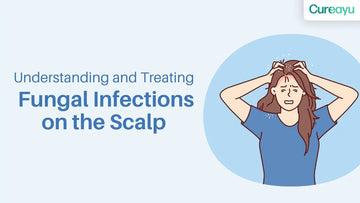Fungal infections on the scalp, though often overlooked, can significantly impact one's quality of life. From the discomfort of itching and inflammation to the embarrassment of visible symptoms like flaking and hair loss, these effects can be both physical and emotional. However, with proper knowledge and awareness, individuals can take proactive steps to address these infections promptly. By understanding the underlying causes, recognizing the signs and symptoms, and exploring various treatment options, individuals can regain control over their scalp health and find lasting relief from the persistent nuisance of fungal infections.
Also Read: Best Shampoo for Fungal Infection on Scalp: Effective Solutions for Healthy Hair
What Is Fungal Infection On Scalp?
A fungal infection on the scalp often manifests as itchy, red patches accompanied by flaking or scaling of the skin. Without proper treatment, this condition, also known as a scalp yeast infection, can spread and lead to hair loss or other complications. Understanding the risk factors and taking preventive measures, like practicing good hygiene and avoiding the sharing of personal items, is essential for avoiding scalp fungal infections.
Main Causes Of Fungal Infection In Hair
Fungal scalp conditions can be caused by several factors, including:
Poor Hygiene: Infrequent hair washing or sharing personal items like combs and hats can spread the infection. Regular cleansing with antifungal shampoos can help in maintaining scalp hygiene and preventing the spread of scalp yeast infections.
Excessive Sweating: This creates a conducive environment for fungal growth. Activities that cause sweating should be followed by a thorough cleansing routine to prevent fungal infections on the scalp.
Hormonal Changes: Changes during puberty or pregnancy can increase the risk of fungal infections due to alterations in sebum production, which creates a favorable environment for fungal growth.
Medical Conditions: Diseases like diabetes or HIV/AIDS can compromise the body's ability to fight off infections. Individuals with these conditions should take extra precautions in maintaining scalp hygiene and monitoring for symptoms of fungal scalp infections.
Also Read: Understanding the Link Between Dandruff and Hair Loss: Causes, Effects, and Effective Treatments
Signs & Symptoms Of Scalp Yeast Infection
Itchy Scalp with Redness and Inflammation: The presence of fungi on the scalp can trigger an immune response, leading to inflammation and irritation. Persistent itching can further exacerbate the condition, creating a cycle of discomfort.
Flaky or Scaly Patches: Fungal infections can disrupt the normal shedding of skin cells, leading to flaky or scaly patches on the scalp's surface. These patches can be mistaken for dandruff but are often more persistent and resistant to regular anti-dandruff treatments.
Hair Loss or Thinning: Damage to hair follicles caused by the infection can result in hair loss or thinning in the infected areas. This can become a distressing symptom, especially if it leads to visible patches of hair loss.
Raised Bumps or Pustules: In some cases, infections can lead to small, raised bumps or pustules filled with pus. These pustules may burst and form crusts, further complicating the scalp condition.
Tenderness or Soreness: The presence of a fungal infection can cause tenderness or soreness in the affected areas. This discomfort can impact daily activities, such as combing or styling hair.
Types Of Scalp Infection
Tinea Capitis: The most common type of fungal infection on the scalp, caused by dermatophytes. It primarily affects children but can also impact adults, leading to itchy, scaly patches and hair loss.
Seborrheic Dermatitis: Although not always fungal in nature, this condition can be exacerbated by fungal growth. It presents as red, inflamed skin with greasy scales, often occurring in areas rich in sebaceous glands.
Folliculitis: Inflammation of hair follicles often caused by fungal or bacterial infections. This condition can lead to painful, swollen bumps that may develop into abscesses, requiring targeted treatment.
Scalp Infection Treatment
Antifungal Shampoo: Regular use of medicated shampoos containing antifungal agents like ketoconazole or selenium sulfide can help eliminate fungal growth and alleviate symptoms of fungal infection on the scalp. These shampoos should be used as per medical advice for the best results.
Oral Antifungal Medications: In severe cases, oral antifungal medications may be prescribed by a healthcare professional to effectively combat the infection from within the body.
Corticosteroids: These can help relieve inflammation and itching associated with scalp fungal infections. Topical corticosteroids may be applied to reduce symptoms and prevent complications.
Proper Hygiene: Maintaining good scalp hygiene, including regular washing with antifungal shampoos and avoiding sharing personal items like combs, hats, or towels, can prevent the spread and recurrence of fungal infections.
Scalp Fungus Treatment - Home Remedies
Tea Tree Oil: Known for its antifungal properties, tea tree oil can be diluted and applied to the scalp. Regular application can help reduce fungal growth and soothe inflammation.
Apple Cider Vinegar: Diluted apple cider vinegar can be used as a rinse to restore the scalp's pH balance and inhibit fungal growth. It can also help remove excess oils and residues that contribute to fungal infections.
Aloe Vera: Applying aloe vera gel to the scalp can soothe inflammation and promote healing. Its natural antifungal properties make it an effective remedy for scalp yeast infections.
Garlic: Crushed garlic cloves mixed with olive oil can be applied to the scalp for its antifungal properties. The mixture should be used with caution to avoid skin irritation but can be an effective natural treatment.
Conclusion
Fungal infections on the scalp can be uncomfortable and persistent if left untreated. However, with proper understanding of the causes, symptoms, and treatment options, individuals can effectively manage these fungal scalp conditions and restore the health of their scalp. Whether through medicated shampoos, oral medications, or natural remedies, addressing fungal infections promptly is essential for alleviating symptoms and preventing recurrence. Remember to consult a healthcare professional for proper diagnosis and treatment recommendations tailored to your specific condition. Taking proactive steps in maintaining scalp hygiene and taking timely action can lead to a healthy, infection-free scalp.








